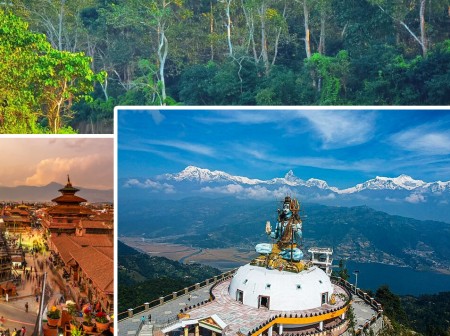
What It’s Really Like to Reach Everest Base Camp
- soleencounters
Reaching Everest Base Camp is more than just a physical milestone — it is a deeply emotional and transformative experience that resonates with trekkers from around the world. Nestled at an altitude of 5,364 meters (17,598 feet), the base camp is the gateway to the highest peak on Earth, Mount Everest. The journey to this remote spot in the heart of the Himalayas is filled with breathtaking landscapes, Sherpa culture, and personal challenges that test both body and spirit.
Table of Contents
This blog post explores what it’s really like to reach Everest Base Camp, offering authentic insights into the emotional highs and physical demands that trekkers encounter. Whether you are considering this iconic trek or preparing to embark on it, understanding these realities will prepare you for one of the most memorable adventures of your life.
The Physical Journey to Everest Base Camp
Challenging Terrain and High Altitude
Trekking to Everest Base Camp involves a gradual ascent through varied terrain, from lush rhododendron forests and traditional Sherpa villages to rugged, rocky trails and glacial moraines.
-
The trek typically begins at Lukla (2,860 m), requiring a short but thrilling flight from Kathmandu.
-
Trekkers pass through Namche Bazaar (3,440 m), the gateway to the Everest Region, before continuing upward to Tengboche, Dingboche, and Lobuche.
-
The trail’s physical challenge increases with altitude, requiring careful acclimatization to avoid altitude sickness.
-
Average daily trekking involves 5-7 hours on uneven paths, often under variable weather conditions.
Altitude Effects on the Body
At Everest Base Camp’s altitude, oxygen levels drop to nearly half of what is available at sea level. This means your body works harder, and symptoms like headaches, nausea, and fatigue are common.
-
Slow pace and frequent rest days are critical.
-
Drinking plenty of water and eating high-energy foods aid acclimatization.
-
Many trekkers find carrying a pulse oximeter useful to monitor oxygen saturation.
Proper preparation and guidance, such as that provided on a professional Everest Base Camp trek, greatly improve the chances of a successful and safe journey.
Emotional and Psychological Insights of Reaching Everest Base Camp
The Sense of Achievement and Awe
Arriving at Everest Base Camp often triggers profound emotions. For many, it is the realization of a lifelong dream.
-
Standing at the foot of Everest evokes awe and humility, surrounded by towering peaks like Lhotse and Nuptse.
-
The camp itself is modest—a cluster of tents and teahouses—but the achievement is monumental.
-
Trekkers commonly experience a surge of pride, relief, and gratitude after days of effort.
Connection to Nature and Culture
The Everest trek is also a journey into the rich cultural tapestry of the Sherpa people and their Buddhist heritage.
-
Visiting monasteries such as Tengboche offers spiritual reflection.
-
Interactions with local families foster mutual respect and understanding.
-
The remote environment encourages mindfulness and appreciation for simplicity.
The Mental Challenge
Beyond physical exhaustion, many trekkers face mental hurdles: isolation, unpredictable weather, and physical discomfort.
-
Perseverance, patience, and positive mindset are essential qualities.
-
Trekking with a supportive guide or group helps maintain motivation.
-
The final arrival at base camp is often accompanied by an emotional release after days of mental resilience.
Best Time to Experience Everest Base Camp
The experience can vary greatly depending on the season:
-
Spring (March to May): Clear views, blooming rhododendrons, warmer days but crowded trails.
-
Autumn (September to November): Stable weather, spectacular mountain panoramas, vibrant local festivals.
-
Winter and Monsoon seasons are less popular due to harsh conditions but offer solitude for experienced trekkers.
Seasonal timing affects not only the physical conditions but also the emotional atmosphere, from bustling excitement to serene isolation.
Tips for Preparing Physically and Emotionally
-
Train for Endurance: Cardiovascular fitness, leg strength, and stamina are vital.
-
Learn About Altitude: Understand symptoms of acute mountain sickness and prevention strategies.
-
Pack Smart: Include layered clothing, good hiking boots, and essential trekking gear.
-
Mental Preparation: Practice mindfulness or meditation to stay calm and focused.
-
Hire Experienced Guides: Local guides enhance safety, logistics, and cultural experience.
Proper preparation ensures you can fully embrace the rewarding emotional and physical aspects of reaching Everest Base Camp.
Why Choose a Professional Guide for Your Everest Base Camp Trek?
Experienced local guides provide invaluable support in navigating the challenging terrain, managing permits, and acclimatization schedules. They also deepen your connection to Sherpa culture and ensure your trek is both safe and enriching.
For detailed guidance and to book your trek, explore our Everest Base Camp Trek packages. Our knowledgeable team at Sole Encounters Trekking Pvt. Ltd. is dedicated to creating unforgettable experiences for trekkers of all levels.
Conclusion
Reaching Everest Base Camp is a physically demanding and emotionally uplifting adventure that stays with trekkers long after the journey ends. It is a testament to human endurance, the beauty of nature, and cultural richness. Understanding the realities of this experience prepares you for both the challenges and the profound rewards that await.
If you are ready to take on this life-changing trek or want expert advice on planning your expedition, please contact us or talk to our experts at Sole Encounters Trekking Pvt. Ltd.
Embark on the Everest Base Camp trek with confidence and make memories that will last a lifetime.
Related Pages:
-
Trekking in Nepal
-
Sagarmatha National Park
Recent Posts
.jpg)
3rd Jul, 2025
.jpg)
4th Jul, 2025
.jpg)
4th Jul, 2025
.jpg)
7th Jul, 2025
.jpg)
8th Jul, 2025
.jpg)
8th Jul, 2025
.jpg)
8th Jul, 2025

10th Jul, 2025








